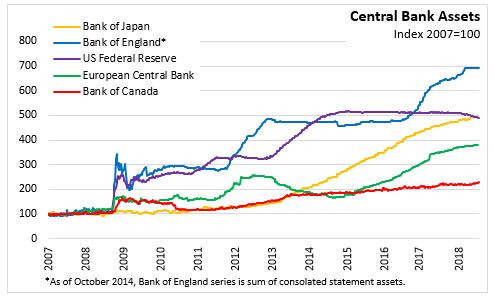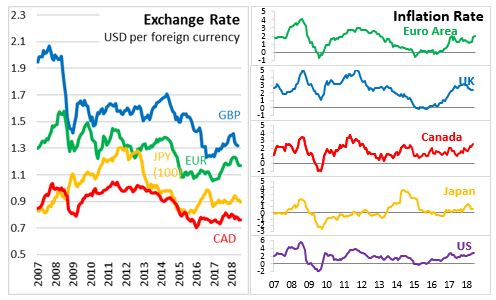The Economics and Statistics Division maintains archives of previous publications for accountability purposes, but makes no updates to keep these documents current with the latest data revisions from Statistics Canada. As a result, information in older documents may not be accurate. Please exercise caution when referring to older documents. For the latest information and historical data, please contact the individual listed to the right.
<--- Return to Archive
For additional information relating to this article, please contact:
July 26, 2018MONETARY POLICY: EURO AREA At today’s meeting, the Governing Council of the European Central Bank(ECB) announced that the key ECB interest rates are unchanged with the interest rates on main refinancing operations, marginal lending facility and the deposit facility at 0.00%, 0.25% and -0.40% respectively. The rates are expected to remain at their present levels at least through the summer of 2019. Monthly asset purchases will run at the current pace of €30 billion per month until September 2018 before a reduction to €15 billion per month until December 2018 after which net purchases will end.
Euro area real GDP grew 0.4 per cent in Q1, following growth of 0.7 per cent in the previous quarter. The easing of growth reflects a pullback from higher growth in 2017 and is related to weaker external trade, uncertainty, and supply-side factors. The latest indicators point to ongoing solid and broad-based economic growth in line with ECB projections. Monetary policy measures have facilitated deleveraging and underpin domestic demand. Private consumption is supported by ongoing employment gains from past labour market reforms. Business investment is benefiting from favourable financing, rising profits, and solid demand. Euro area exports are supported by expanding global demand.
Euro area inflation was 2.0 per cent in June, up from 1.9 per cent in May and 1.2 per cent in April, reflecting higher energy and food prices. Given oil future prices, headline inflation is likely to remain at current levels through 2018. Underlying inflation remains generally muted but domestic cost pressures are strengthening amid high capacity utilization and tighter labour markets. Underlying inflation is expected to pick up towards the end of 2018 and over the medium term.



Sources:
European Central Bank
<--- Return to Archive